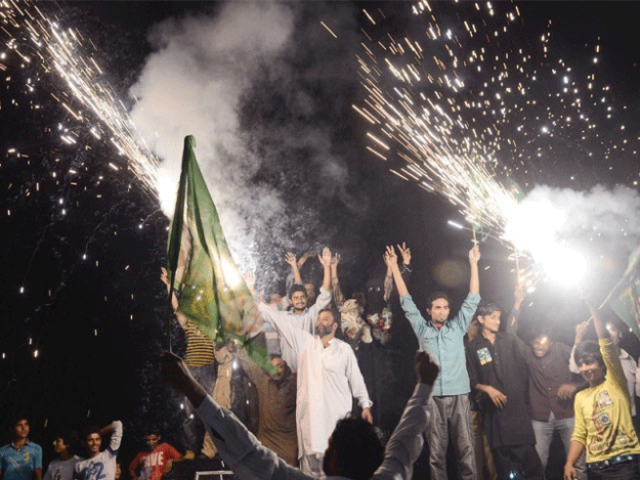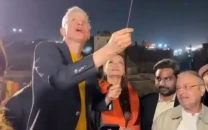Explaining ruling party’s popularity
The responses showed that the vast majority had little actual knowledge of how local governments will work in Lahore

PHOTO: AFP
Prior to the first phase of the local government elections, The Express Tribune conducted a survey of voters from inner-city Lahore in an attempt to gauge attitudes towards Pakistan’s latest exercise in democracy. A random sample of 111 respondents from four NA constituencies were asked about a range of issues including their expectations from the new local governments, their attitudes towards various parties, and the reasons underpinning their decisions to vote. While it would be a mistake to treat this small poll as being representative of country-wide trends, the responses received from these individuals nonetheless provide some insight into voter perceptions and behaviour.
When disaggregating responses that identified personal attributes and reputation (of candidates) as reasons for voting, it becomes clear that there are some specific characteristics that voters look for. While many simply used generic terms like ‘honest’ and ‘hardworking’ to describe their preferred candidates, a significant number highlighted the capacity to get things done (often based on past experience) as being crucial. This emphasis on ‘getting things done’ is reflective of the enduring strength of patronage politics, whereby voters look for candidates who have the institutional and political connections necessary to engage in the thana-kutchery disputes and partisan service delivery.
These findings make even more sense when seen in context of results from the first set of questions about expectations from local governments. The responses showed that the vast majority had little actual knowledge of how local governments will work in Lahore (and the Punjab) as they expect candidates to deliver services that do not technically fall under the latter’s jurisdiction. Thus, an explanation of the support enjoyed by the elected representatives can be that they are capable of acting as effective conduits to the state, rather than as functionaries with clearly defined duties and responsibilities.
That voters might be thinking along these lines also fits with the broader structure of the local government system in the Punjab. As is made clear by the Local Government Act of 2013 (amended), new local governments will actually enjoy very little powers; they have limited revenue-raising powers, will have the budgets overseen by provincial bureaucrats, and will be beholden to the provincial government for funding.
The provincial government retains the right to ‘coordinate’ between local governments, mediate between them in the event of disputes, even dismiss them as and when warranted. Thus, local governments and their functionaries will only be able to function effectively, if at all, if they enjoy a close and comfortable relationship with the party in power at the provincial level.
This is precisely why the results of the elections in the Punjab show such an overwhelming level of support for the PML-N. Some of the PML-N candidates campaigning for positions in local government undoubtedly argued that only they would be able to ‘get things done’ given their ties to the party in power. The success enjoyed by ‘independents’ only confirms this fact. As has been established by constituency-level reports from across the province, many ‘independents’ were simply PML-N supporters, or members of PML-N factions, that were not granted party tickets due to internal divisions.
Traditionally, casual observers of Pakistani politics have often lamented the choices made by the electorate, failing to understand why parties like the PPP, the MQM, and the PML-N continue to win despite performing poorly in terms of governance. One explanation has been that voters, lacking information and political education, simply fall prey to the empty rhetoric and keep voting flawed parties and candidates into power. Such an approach fails to appreciate precisely how politics works at the local level in much of Pakistan. With weak and dysfunctional state institutions, the provision of public services is almost entirely dependent on the disbursement of patronage by the political elite. As such, voters are forced to choose between parties and candidates that can get things done (even when known to be inefficient and prone to corruption).
There are important lessons to be learnt here. Even if the smaller scale of local government elections may help smaller and newer parties to get their candidates elected, the structure of the local government system will all but ensure that votes for candidates not associated with the ruling party end up wasted. It is as important as ever to press for electoral reforms. Elections held on the basis of proportional representation, rather than first-past-the-post, may ensure that non-incumbent parties get a greater share of representation and power. The reduction in provincial control of local governments and fostering local fiscal and policy-making autonomy could go a long way towards breaking the hold of traditional constituency level elites.
Rigging is an important issue that needs to be addressed but parties like the PTI would do well to reflect, instead, on how the very institutional framework of politics in the Punjab (and indeed, other parts of Pakistan) is biased against breakthroughs made by smaller and newer parties. This is an important area of reform and analysis that is, unfortunately, missed by most of the political mainstream.
Published in The Express Tribune, December 25th, 2015.



















COMMENTS
Comments are moderated and generally will be posted if they are on-topic and not abusive.
For more information, please see our Comments FAQ